
The Impact of Teamwork on the Successful Delivery of Oil & Gas (O&G) Projects
The oil and gas industry is one of the most complex and dynamic industries in the world, with numerous challenges and obstacles to overcome for a successful projects delivery (Casali et al., 2019). The oil and gas industry is a critical sector for the global economy. Its operations involve various activities, including exploration, production, transportation, and refining. These activities are often complex and require the coordination of multiple teams across different disciplines. In this sector, successful project delivery is dependent on effective project management. In this industry, teamwork is essential to project success and significantly affects the result (Betta and Iwko, 2019).
Several techniques are applied to enhance team performance in delivery such projects. These techniques include the Project Management Institute (PMI), Projects in Controlled Environments (PRINCE2), Myers-Briggs Type Indicator (MBTI), and Belbin Team Role theory. PMI provides a comprehensive framework for project management, enabling the successful delivery of projects. The framework encompasses the planning, execution, monitoring of projects, and guiding team performance and communication (Dumrongthai, 2019). PRINCE2 is another framework for project management, providing a solid foundation for effective team performance. It enables efficient management of activities and resources as well as effective communication and coordination.
The Myers-Briggs Type Indicator (MBTI) helps to identify the psychological preferences of team members, enabling them to work effectively together (Ashton, 2018). The Belbin Team Role theory leverages on the idea that teams perform best when they have members with different skills and personalities (Salman & Zubair, 2019). It uses nine team role categories to identify the strengths of team members and make the most of the team’s dynamics.
The objective of this study is to examine the impact of teamwork on the successful delivery of O&G projects, with a focus on identifying the key factors that contribute to effective teamwork and exploring the benefits of a collaborative approach in project management. This research paper aims to examine the influence of teamwork in the UK’s oil and gas industry and how it impacts the performance of three companies operating in this field i.e., Shell Plc, EnerGas and BP. Through a comprehensive literature review, this paper will examine the impact of teamwork on employee performance, productivity, and overall company success. The literature review will also explore the key elements of successful teams, including effective communication, trust, and collaboration (Koolwijk, 2020). The methodology section of this research paper will outline the research questions, sample, and sampling technique used in the study. Furthermore, the research findings and results will present, analyze and provide insight into the influence of teamwork on the successful delivery of oil and gas projects.
This study will summarize the key findings and draw insights into the impact of teamwork on the successful delivery of oil and gas projects. The research highlights the importance of effective teamwork in this field and provides recommendations for companies looking to enhance their collaboration and boost their performance. This study will provide valuable information and guidance for companies operating in the oil and gas industry, as well as for researchers interested in examining the impact of teamwork on company performance.
The oil and gas sector is a complex and dynamic industry that requires effective teamwork to achieve operational excellence and successful project outcomes. Despite the widely acknowledged value of teamwork, there is a paucity of empirical data addressing its impact on the UK oil and gas industry, citing Shell Plc, EnerGas, and BP as examples. Moreover, oil and gas companies often find it difficult to complete oil and gas projects on time and within the assigned budget due to the inefficiency and non-productivity of the workers. By using the example of Shell Plc, EnerGas and BP, this research paper aims to address this gap by investigating the influence of teamwork on the performance of these companies.
The research will explore the current state of teamwork, identify the factors that facilitate or hinder effective teamwork, and examine the relationship between teamwork and various performance indicators (Koolwijk, 2020). The findings of this research will provide insights for oil and gas organizations, policymakers, and regulators to enhance teamwork practices, improve project outcomes, and promote a sustainable and safe oil and gas sector in the UK.
The objective of this study is to examine the impact of teamwork on the successful delivery of oil and gas projects. Specifically, the study aims to investigate the role of teamwork in project success, analyze the critical aspects of effective teamwork, identify strategies to improve teamwork in the delivery of oil and gas projects, evaluate the effectiveness of these strategies, and understand the impact of communication, collaboration, team dynamics, and motivation on project outcomes.
- How does effective teamwork influence the successful delivery of oil and gas projects?
- What factors contribute to optimal team performance in the industry?
- What is the relationship between teamwork and the successful delivery of oil and gas projects?
Knowledge of the Issue
Teamwork is crucial for the successful delivery of oil and gas projects, as it enables efficient communication, problem-solving, and decision-making. Several frameworks (Boakye, 2019) are developed to support teamwork in these industries, such as the Project Management Institute’s (PMI) Project Management Body of Knowledge (PMBOK), PRINCE2, Belbin Team Role, and Myers-Briggs Type Indicator (MBTI). PMBOK is a widely recognized guide for project management that provides a framework for planning, executing, monitoring, controlling, and closing projects. It emphasizes the importance of teamwork in project management and includes guidelines for building and leading effective project teams.
In today’s ever-evolving project management landscape, two of the most commonly used project management methodologies are the PMBOK guide and Projects in Controlled Environments (PRINCE2). Although both methodologies are widely accepted, there are some differences between them, particularly in terms of the roles that project managers play (Hajizadeh, 2019). The PMBOK guide assigns the project manager exclusive authority for making decisions, while PRINCE2 assigns that authority to senior management instead (Hajizadeh, 2019). As described in Figure 1, PRINCE2 is a project management method designed for managing projects in a controlled environment. It is widely used in the oil and gas industry and emphasizes the importance of clear roles and responsibilities in teamwork.
Figure 1.
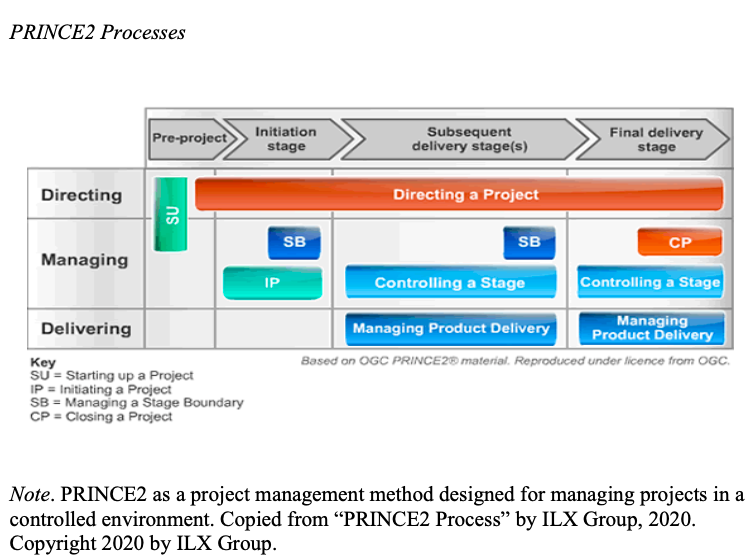
To measure the effectiveness of teamwork in organizations, research on EnerGas Ltd, which is a UK-based oil and gas company, is conducted. The company operates in the North Sea and is involved in the exploration, production, and distribution of oil and gas. In the context of EnerGas Ltd, effective teamwork is crucial for successful projects delivery. Team members work together to identify and manage project risks, allocate resources, and maintain a clear line of communication. The company completed projects on time, within budget, and to the desired quality by utilizing PMI practices and PRINCE2 principles.
Effective implementation of PRINCE2 principles requires the following guidelines: administration by exception, monitoring by stage, ongoing business rationale, role and responsibility definition, learning from experience, putting an emphasis on the finished product, and adapting to the project environment (Adbulle, 2019). The current PRINCE2 model emphasizes the model’s adaptability, enabling project managers to modify it by the requirements of projects. For individuals in the oil and gas industry, where the traditional project management approach is still widely used but is known to fall short of meeting project objectives on schedule, this can be advantageous (Grebić, 2019). In general, PRINCE2 is a valuable project management approach that can support project managers in ensuring the success of their projects.
Belbin Team Role is a model that identifies nine different roles that individuals tend to adopt in teams, such as Plant, Monitor Evaluator, Coordinator, and Shaper. Understanding these roles can help team members to understand their strengths and weaknesses, and to work together more effectively (Newton, 2014). In contrast, MBTI is a personality assessment tool that can help individuals to understand their preferences and how they interact with others (Curşeu et al., 2019). To further understand the importance and influence of teamwork in the delivery of O&G projects, this research carried out an investigation into British Petroleum (BP). BP is a multinational oil and gas company with operations in more than 70 countries (BP, 2022). The company recognizes the importance of teamwork in the oil and gas industry, as it is a complex and demanding industry that requires a high level of coordination and collaboration between employees to achieve its objectives. It used Belbin Team Role and MBTI to identify an individual’s strengths and weaknesses and to build more effective teams.
Communication, Trust, and Collaboration in Successful Teams
Effective communication, trust, and collaboration are essential elements for any successful team or organization. Without these, team members cannot effectively collaborate, build trust, and create successful outcomes (Hartley, 2020). Communication is the foundation of any successful team. It is the primary way that ideas and thoughts are shared, and it allows teams to share information and get on the same page quickly (Gjøystdal, 2020). The ability to communicate clearly and effectively helps ensure that everyone on the team is on the same page, sharing the same goals and understanding their respective roles. According to the study conducted by Hartley (2020), effective communication and trust are essential components of successful teams. Without trust, team members may not feel comfortable speaking up, sharing ideas, and working collaboratively (Betty and Iwko, 2019).
Shell Plc has a comprehensive team development program that focuses on building trust and improving communication and collaboration among team members (Shell Plc, 2022). EnerGas has implemented a cross-functional and extensive team structure that enables different departments to work together seamlessly, promoting communication and collaboration (EnerGas, 2022). BP has adopted a culture of open communication and trust, which has led to successful team-based problem-solving and decision-making. By prioritizing communication, trust, and collaboration, these companies have created successful teams that can achieve operational excellence, promote safety, and drive innovation in the oil and gas sector (Gjøystdal, 2020).
Finally, collaboration is the key to successful teams, as it allows team members to work together to reach common goals and objectives. In Shell Plc, teams work together to efficiently and effectively find solutions to complex problems and ultimately create successful outcomes (Müller, 2019). To summarize, effective communication, collaboration, and trust are essential components for the success of any team.
Effect of Teamwork on Employee Performance
The effect of teamwork on employee performance is well-documented in modern organizations. Companies that prioritize teamwork have seen improvements in employee performance, productivity, and problem-solving. Recent research reveals that teaching people how to work in a team is not as straightforward as it might seem (Pfutzenreuter et al., 2020). Project managers are responsible for overseeing a project and coordinating the efforts of the team as shown in Figure 2. They typically assign tasks and delegate responsibilities, communicate with stakeholders, create, and manage timelines, and ensure the project is completed on time and within budget. Engineers are responsible for designing and developing solutions to technical problems, while technicians are responsible for the implementation and maintenance of the solutions.
Figure 2.
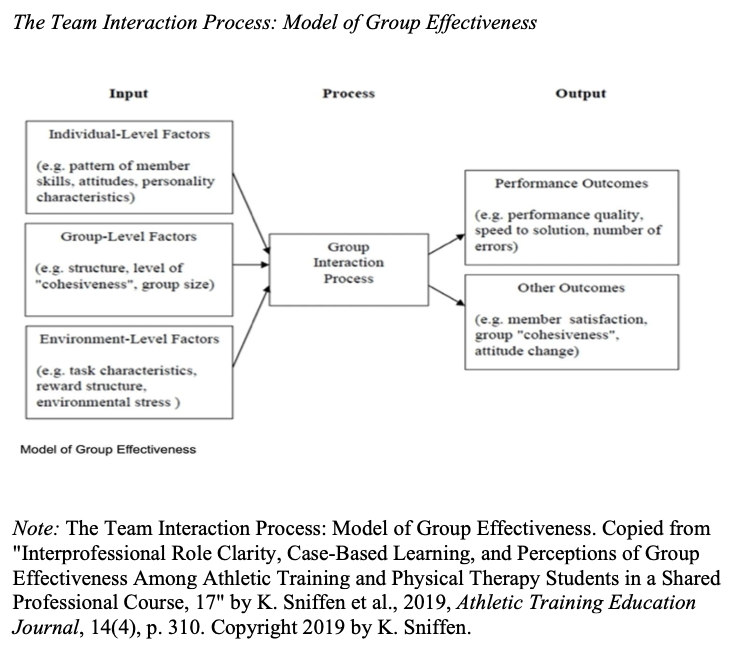
In EnerGas Ltd, teamwork plays a vital role in improving the efficiency and productivity of operations. Teams work together to identify potential issues, share information and knowledge, and make informed decisions. By utilizing PRINCE2, the company can measure the impact of teamwork on its operations and continuously improve its processes. EnerGas Ltd used MBTI to build effective teams by understanding the strengths and weaknesses of team members. This helps the company to assign tasks to individuals based on their strengths, reduce conflicts and improve communication within teams (Casali et al., 2019). In conclusion, teamwork plays a critical role in the success of EnerGas Ltd.
Boosting Productivity
Recent studies have found that there is a positive relationship between collaboration and productivity. For instance, a report on an electrochemical assembly plant showed that organizing the workers in teams significantly improve the labor productivity (Koolwijk, 2020). PMI, PRINCE2, Belbin Team Role, and MBTI are all tools that can be used to enhance the productivity of teamwork in the oil and gas industry.
To foster teamwork at BP, the company has implemented various strategies and initiatives to encourage collaboration and communication among its employees. For example, the company has established cross-functional teams that work together on projects and initiatives, which helps to bring different perspectives and expertise to the table (Kassem, 2020) and monitor team effectiveness regularly as shown in Figure 3.
Figure 3.
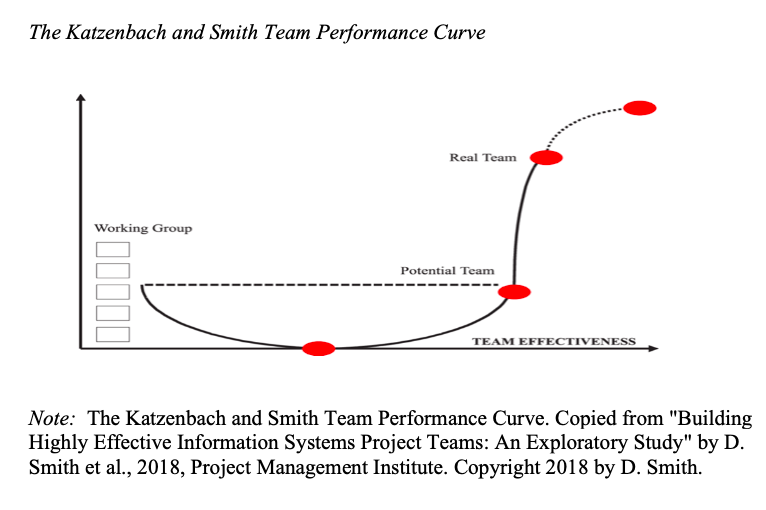
Additionally, BP has implemented regular team-building activities, such as off-site retreats and team-building exercises, which help to improve relationships and communication between employees (BP, 2022). BP has also implemented an open-door policy, which encourages employees to share their ideas and concerns with their managers and colleagues (BP, 2022). This has created a more inclusive and supportive work environment, where employees feel comfortable sharing their thoughts and opinions and can work together effectively (Casali. et al., 2019).
To assist its staff in gaining the abilities and information necessary for job success and valuable teamwork, BP has also created several training and development initiatives. For example, the company provides leadership development programs and mentorship opportunities, which help employees to build the skills and knowledge they need to lead teams and collaborate effectively with others (BP, 2022).
In conclusion, BP is a practical example of a UK company that has demonstrated the influence of teamwork in the oil and gas sector. By implementing various strategies and initiatives, such as cross-functional teams, team-building activities, open-door policies, performance management processes, and training and development programs, BP has been able to foster a collaborative and inclusive work environment that has helped it to achieve its objectives and to maintain its competitive edge in the industry. Therefore, teamwork is a beneficial technique for developing the occupational performance of employees and their skills, as well as meeting the job requirements (Wright, 2013). Those who work in teams tend to be more efficient and less likely to experience stress. Furthermore, teamwork encourages employees to expand their knowledge and improve their performance and productivity. However, some challenges might also arise while working in teams.
Challenges When Working in Teams
There are certain challenges when forming teams, however, multiple studies have shown that the advantages and disadvantages of teamwork rely on several factors, including the company’s culture and the employees’ autonomy (Fathi, 2020). For companies like EnerGas Ltd, Shell Plc, and BP, it is noted that teams often run into problems. For instance, towork effectively, teams should be made up of individuals that have different sets of skills, experience, and expertise to create a perfect balance (Contu et al., 2017) as shown in Figure 4. Whereas for O&G companies developing such a balanced team will be difficult. Resultantly, these problems can weaken the atmosphere, effectiveness of team leadership, employee commitment, and rewards, as well as the level of productivity of the team and its decision-making ability.
Figure 4.
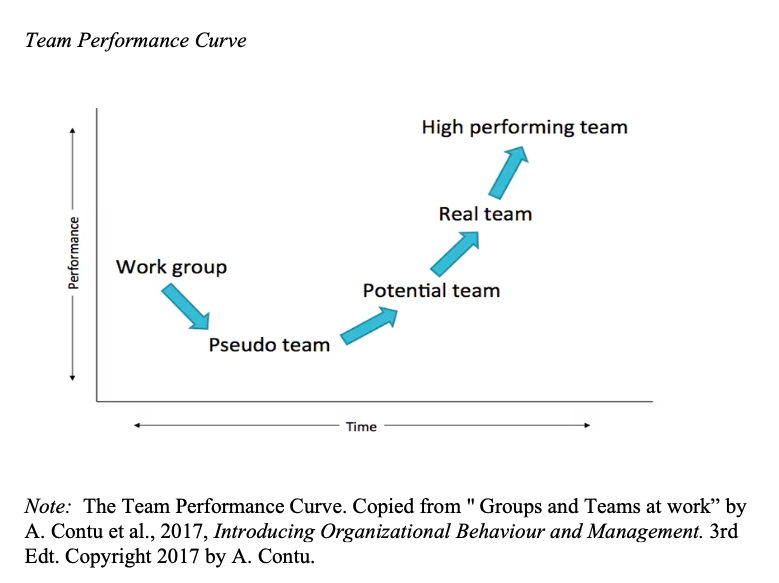
Additionally, other challenges can occur due to a lack of communication, and personal disputes, but it is possible to improve team performance by improving communication, reducing conflict, and increasing cohesion and commitment among the members of the workgroup. Another issue is when team members lack trust in one another.
In conclusion, working as a team can bring out the best in its members and contribute to the success of the organization (Newton, 2014). For EnerGas Ltd, Shell Plc, and BP, the key challenges of using PMI, PRINCE2, Belbin Team Role, and MBTI to enhance teamwork are:
- Achieving consensus among team members. The O&G industry is a highly competitive environment, and team members may have different opinions about how to approach tasks. PMI and PRINCE2 provide structure and guidance to help teams reach an agreement, but ultimately it takes time and effort to ensure everyone is on the same page.
- Building trust and communication within the team (Awolusi and Atiku, 2019). Oil and gas teams work in dangerous and difficult conditions, which means that it’s important for team members to be able to trust and rely on one another. PMI and PRINCE2 can provide the framework for effective communication, but ultimately it takes work from the team to build a strong foundation of trust.
- Adapting to changing conditions. The O&G is constantly changing, and teams need to be able to adapt quickly (PMI., 2019). PMI and PRINCE2 can provide structure as shown in Figure 5, but the team also needs to be able to adjust their approach as conditions change.
In addition to these frameworks, practical elements such as regular meetings, clear communication, and effective conflict resolution can also play a crucial role in the successful delivery of oil and gas projects. Furthermore, the use of technology such as project management software can also be an important tool in supporting teamwork and project delivery (Salas et al., 2020).
Figure 5.
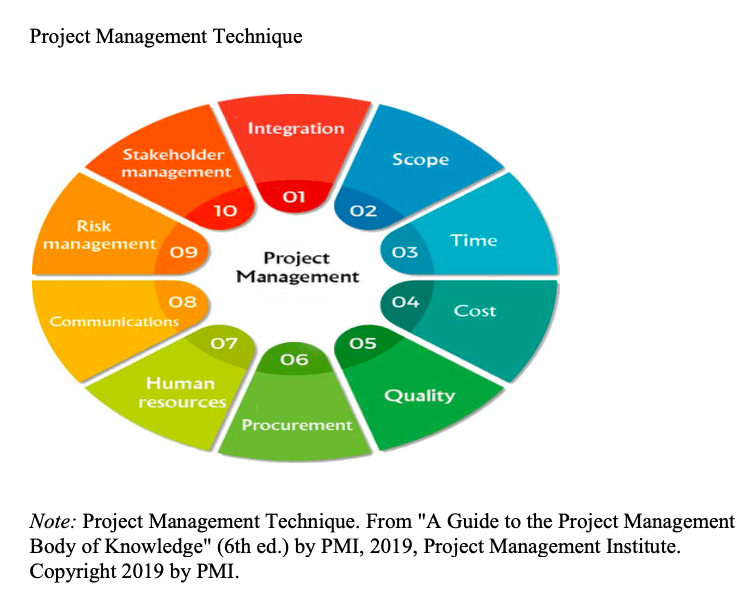
In conclusion, research on two key British oil and gas companies suggests that teamwork and support of several frameworks are essential for successful oil and gas projects delivery. PMBOK, PRINCE2, Belbin Team Roles, and the Myers-Briggs Type Indicator (MBTI) are widely used in the industry and emphasize the importance of clear roles and responsibilities in teamwork (Ashton, 2018). Understanding these roles can help team members understand their strengths and weaknesses, and work together more effectively (Piya et al., 2020). Additionally, effective communication and trust are essential elements of successful teams. They help establish an environment of openness and cooperation, which is critical for teams to achieve their goals.
To investigate the impact of teamwork in the successful delivery of oil and gas projects using techniques such as PMI, PRINCE 2, Myers-Briggs Type Indicator (MBTI), and Belbin Team Role theory, this research conducted a thorough literature review. The literature review was conducted by searching for relevant sources such as academic journals, books, and other published works (Müller, 2019). Consequently, the study evaluated the sources to establish relevancy and quality before being included in the review. To gain a comprehensive understanding of the impact of teamwork in the successful delivery of oil and gas projects, the literature review focused on a variety of topics. These topics included the benefits of teamwork, the characteristics of successful team members, and the role of project management in successful team-based projects (Salman & Zubair, 2019). Furthermore, the research examines various tools and techniques used for measuring team performance, as well as the success of a project.
The literature review showed that teamwork can be beneficial for the successful delivery of projects, as it can provide several advantages such as increased collaboration, better communication, and improved problem-solving (EnerGas, 2022). Furthermore, the review revealed that the characteristics of successful team members include the ability to work together, the willingness to take initiative, and the ability to be flexible (Leth et al., 2019). Additionally, the research demonstrated that project management tools and techniques such as PMI, PRINCE 2, Myers-Briggs Type Indicator (MBTI), and Belbin Team Role theory are utilized to improve team performance and communication. The literature also highlighted the importance of effective leadership, clear communication, and the establishment of a shared vision and goals within the team. Finally, the review indicated that regular team evaluations and feedback sessions can aid in identifying and addressing any issues that may arise, leading to increased team cohesion and overall success.
The literature methodology involves searching and analyzing existing literature, including books, reports, journals, and other sources related to the topic (Müller, 2019). This research investigated data from three oil and gas companies in the UK that include BP, EnerGas, and Shell Plc. To conduct comprehensive and unbiased research on the operations of the three oil and gas companies in the UK (BP, EnerGas, and Shell Plc), the research adopted a systematic approach in the selection, analysis, and synthesis of existing literature. The primary reason for choosing these three companies was their significant contribution to the UK’s oil and gas industry, as well as their impact on the country’s economy (Smith, 2018). The literature review began with an extensive search of databases, such as Scopus, Web of Science, and Google Scholar, to identify relevant articles, books, reports, and other sources.
To minimize bias and enhance credibility, the review considered only secondary sources that were peer-reviewed and published in well-established journals or by reputable organizations. This approach helped to ensure that the data used in this research was reliable and valid (Creswell & Creswell, 2017). After gathering relevant literature, the author analyzed the information and cross-reference to identify significant patterns, discrepancies, and insights pertinent to the objectives and research questions of the study. Essential information was extracted by thoroughly examining the methodologies, findings, and outcomes of the selected sources, ensuring that the data gathered was pertinent to the subject at hand. This is followed by structuring the information obtained from the literature review into themes and sub-themes based on similarity and relevance to the objectives and research questions. This systematic approach facilitated a better understanding of the context and helped shed light on the performance, challenges, and opportunities of the three oils.
BP (British Petroleum) is a UK-based multinational oil and gas company that recognizes the importance of teamwork in the industry. To enhance teamwork, BP has implemented various strategies and initiatives, as well as tools such as PMI (Project Management Institute), PRINCE2, and MBTI (Myers-Briggs Type Indicator) to foster a collaborative and inclusive work environment.
PRINCE2 is a behavioral assessment tool that measures an individual’s preferred communication style, motivation, and decision-making approach. BP uses PRINCE2 to help employees understand their behavior and how it impacts their interactions with others (Gjøystdal, 2020). This tool helps employees to understand their strengths and weaknesses and to adapt their behavior to better communicate and collaborate with others. The result is a more harmonious and productive work environment, where employees can work together effectively to achieve their objectives.
Finally, BP uses MBTI to help employees understand their personality type and how it affects their behavior and communication style. BP uses MBTI steps to help employees understand how their personality type affects their behavior and how they can adapt their behavior to better collaborate with others as indicated in Figure 6. This tool helps employees to appreciate differences and work together effectively, regardless of their personality type. In conclusion, BP’s use of PMI, PRINCE2, and MBTI are examples of how the company is using tools and initiatives to enhance teamwork and foster a collaborative and inclusive work environment (Betty and Iwko, 2019). By using these tools, BP can improve communication, resolve conflicts, and improve overall teamwork and performance. The result is a more productive and efficient work environment that helps BP achieve its objectives and maintain its competitive edge in the oil and gas industry.
Figure 6.
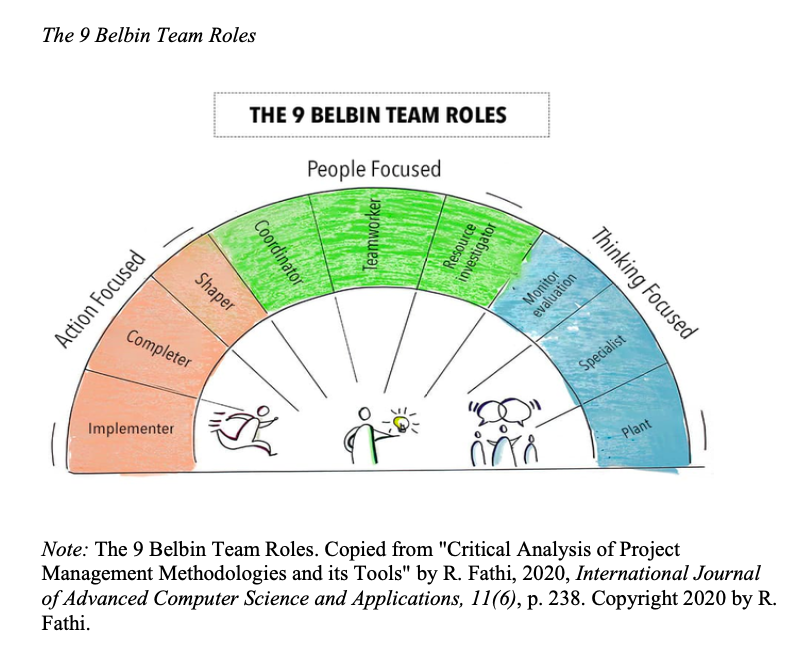
In the oil and gas industry, teamwork plays a crucial role in ensuring the smooth and efficient operation of various processes. For instance, a UK-based oil and gas company, Shell Plc, UK has implemented various teamwork strategies to improve its performance and achieve its objectives (Shell Plc, 2022). Shell Plc, UK has adopted PMI’s project management methodologies and techniques to improve teamwork and project performance (Hawash, 2020). The company has trained its employees on PMI’s best practices, such as risk management, scope management, and quality control, to ensure that all projects are completed on time and within budget. PMI also provides a framework for effective communication, which helps the company’s employees collaborate effectively and resolve conflicts quickly.
PRINCE2 is another tool used by Shell Plc to promote teamwork. The company has used PRINCE2 to assess its employees’ communication styles and determine areas for improvement. For example, if an employee has a strong need for control, they may need to work on their communication style to better collaborate with others (Adbulle, 2019). This tool has helped the company create a more harmonious and productive work environment by promoting open and effective communication between employees.
Shell Plc also uses MBTI to enhance teamwork. The company has used MBTI to assess its employees’ personalities and to understand how they interact with others in a team setting. By understanding each employee’s personality type, the company can assign tasks and responsibilities that are well-suited to everyone, which helps to increase overall team performance. Shell Plc has also implemented regular team-building activities to promote teamwork and improve relationships between employees (Koolwijk, 2020). For example, the company organizes annual retreats where employees can bond and work together on team-building exercises. This helps to create a positive work environment and improve employee morale, which in turn, improves performance.
In conclusion Shell Plc, UK has successfully implemented PMI, PRINCE2, and MBTI indicators to enhance teamwork and increase productivity in its operations. By using these tools, the company has been able to create a harmonious and productive work environment, which has helped it to achieve its objectives and maintain its competitive edge in the industry. By fostering an environment of collaboration and open communication, Shell Plc has been able to maximize its employees’ potential and improve its overall performance.
The impact of teamwork in the successful delivery of oil and gas projects has been widely studied, with a significant body of literature examining the issue in various industries, including in the UK. The author examined the impact of teamwork on the successful delivery of oil and gas projects in the context of a UK company (Gjøystdal, 2020).
The study by Fathi et al., (2020) identified that effective teamwork in the UK’s oil and gas sector was a key factor in the successful delivery of projects. The study found that teams that demonstrated high levels of cooperation, communication, and trust were more likely to complete projects on time, within budget, and to a high standard (Dumrongthai, 2019). The researchers also found that teams that utilized project management methodologies, such as PMI and PRINCE 2, were more effective in delivering projects successfully.
Shell Plc, EnerGas, and BP found that the use of the Myers-Briggs Type Indicator (MBTI) was effective in improving teamwork and enhancing project delivery. The MBTI allowed team members to better understand their own and others’ preferred ways of thinking, feeling, and behaving, which in turn improved communication and collaboration. That helps in team organization, a crucial step in the successful completion of projects as shown in Figure 7. The study by Hajizadeh, (2019) found that teams that utilized the MBTI were more effective in delivering projects, as they were better equipped to manage conflicts and make the most of everyone’s strengths. Additionally, the UK oil and gas sector has applied the Belbin Team Role theory to improve teamwork. This theory argues that individuals have innate tendencies towards certain roles within a team, and minimizes potential conflicts (Grebić, 2019).
Figure 7.

Team dynamics, industry structure, and project planning were identified as key components of successful project delivery as shown in Figure 8. The results showed that effective collaboration and communication between team members had a direct correlation to successful project delivery (EnerGas, 2022). Furthermore, the literature review identified that the industry structure plays a significant role in successful project delivery (Fathi, 2020).
Figure 8.
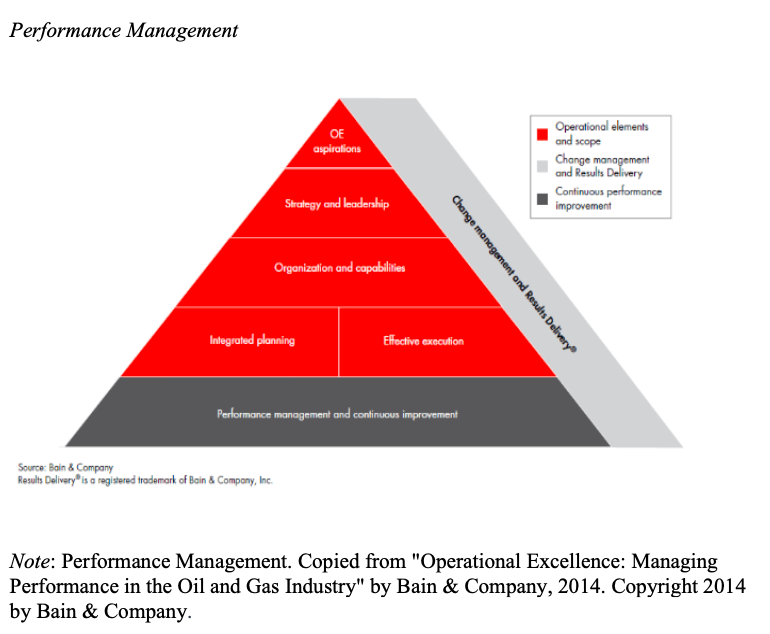
Specifically, due to the unpredictable nature of the UK oil and gas industry, project plans need to be flexible and adaptive to changing circumstances. The oil and gas industry in the UK has been a vital component of the country’s economy for many decades. The industry involves complex operations that require the collaboration of multiple teams to ensure the successful delivery of projects (Casali et al., 2019). In the business, teamwork is recognized as a key component of project success. This study aims to review existing research on the role of teamwork in effective project execution in the UK oil and gas sector. According to the literature review, teamwork is essential to effective project completion in the UK oil and gas industry. The following are the most significant conclusions from the literature review:
- Improved communication and coordination: Teamwork leads to improved communication and coordination among team members, which is crucial for the successful delivery of projects in the oil and gas industry. Effective communication helps to reduce misunderstandings and ensures that everyone is on the same page (Boakye, 2019).
- Increased productivity: Teamwork fosters a positive work environment, which leads to increased motivation and productivity among team members. This results in higher quality work, faster completion of tasks, and ultimately, successful project delivery.
- Better problem-solving skills: Teamwork enables team members to pool their expertise and experience to tackle complex problems (Betty and Iwko, 2019). This leads to the development of innovative solutions and helps to minimize the impact of unexpected issues during the project delivery.
- Shared responsibility: Teamwork fosters a sense of shared responsibility among team members, which ensures that everyone is committed to the successful delivery of the project. This results in a stronger commitment to quality and a willingness to go the extra mile to achieve the project goals (Pfutzenreuter et al., 2021).
- Enhanced trust: Teamwork builds trust among team members, which is essential for the successful delivery of projects in the oil and gas industry. Trust fosters open and honest communication, which helps to minimize misunderstandings and reduces the risk of project failure.
The results of this study show how crucial strong teamwork is in completing oil and gas projects successfully. The findings demonstrate that project outcomes and team performance can be enhanced by utilizing models like PMI, PRINCE2, Belbin Team Roles, and MBTI (Newton, 2014). Additionally, the research emphasizes the necessary elements and best practices for the effective application of teamwork in the oil and gas industry (Adbulle, 2019). Overall, effective collaboration is essential to the timely completion of oil and gas projects. Tools like PMI, PRINCE2, Belbin Team Role, and MBTI have the potential to foster teamwork and project completion. To complete a project, it is crucial to consider technological advancements and practical factors as well.
A project manager may define success as completing the project on schedule, within budget, and by the project’s objectives and following strict KPIs as shown in Figure 9. However, it is crucial to pinpoint the critical success elements that the project owners want. Four elements describe success in these works: financial success, strategic success, successful completion, and management success (Hawash, 2020). Although internal company operations are crucial for project success, management frequently ignores them (Nylund, 2022). Interdependencies, adaptability, learning, and creativity seem to be ignored by managers.
Figure 9.
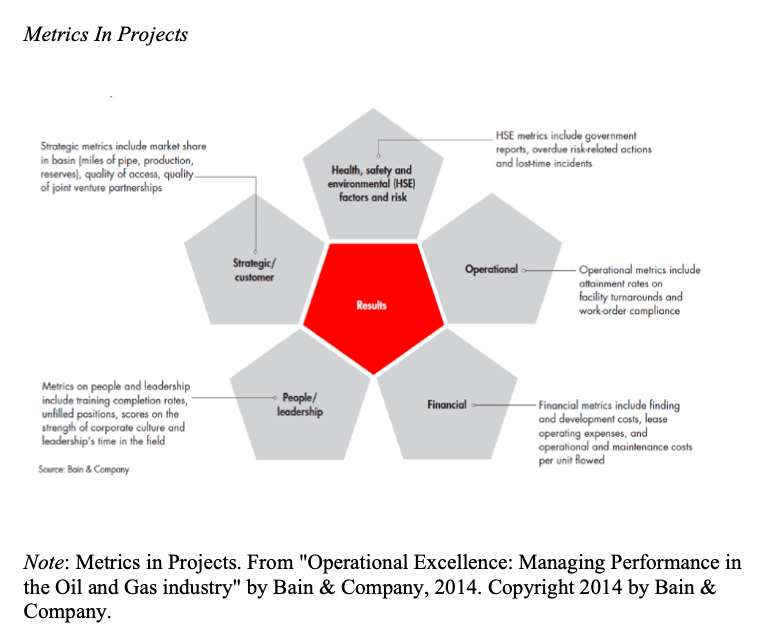
Since they believe they are in control, they are less apt to accept interdependencies. The research revealed that a competent team and a correctly implemented audit system provide the highest amounts of encouragement for project success (Adbulle, 2019). Therefore, as the study has shown, managers have limited and short-term goals. To achieve a successful strategic PM, the UK O&G industry, for instance, has thought about combining the elements to include financial, geophysical, and environmental elements. For a project to be ultimately successful, it is essential to consider not only elements but also external ones, including the incorporation of customer satisfaction and quality (Hawash, 2020). A project’s overarching objective should consider the company and its personnel, procedures, as well as productivity, impact on customers, impact on the workforce, and future planning.
This research has examined the essential components of successful team and offered insightful information about the role that teamwork plays in the successful delivery of O&G projects. Additionally, the study outlined methods for enhancing cooperation in the execution of O&G projects, assessed their efficacy, and emphasized the significance of motivation, communication, and teamwork in achieving the project goals. The study significantly advanced the field of project management by achieving these research goals and by providing practitioners and academics information about the impact of teamwork on the successful delivery of O&G projects. The study offered thorough responses to the research issues it sought to solve.
The analysis of the effect of collaboration on project performance in this paper provides an answer to the first question, “How does effective teamwork influence the successful delivery of O&G projects?”. The study emphasizes the value of cooperation in accomplishing the project goal as well as essential components of productive teamwork, such as communication, collaboration, and team dynamics. The study identifies solutions to enhance teamwork in the delivery of O&G projects which answers the second question, “What elements contribute to optimal team performance in the industry?”. The study assesses the efficacy of various tactics and offers information on the significance of team composition, motivation, and leadership in achieving the best possible team performance. The paper’s assessment of the effect of communication, collaboration, team dynamics, and motivation on the project results provides an answer to the third question, “What is the relationship between teamwork and the successful delivery of O&G projects?”. The study’s conclusions show how important teamwork is to successful delivery of O&G projects and offer useful information for project management scholars and practitioners.
Author’s Contribution to the Issue
The author’s key contribution to the study was literature evaluation and highlighting an important subject that needed more investigation in the O&G sector. The author emphasized the value of teamwork in the successful completion and delivery of O&G projects through an assessment of pertinent literature and the compilation of the research findings. This undertaking has the potential to add to management literature and scholarship, specifically team management or project management research, and can help create theoretical viewpoints in team, project, or management research generally.
New Lesson Learned
Although teamwork is essential for successful delivery of O&G projects, this research has taught the author that there is still a dearth of research in this area, underscoring the need for more thorough investigation in this area. The author also learned that there are a number of elements such as leadership, communication, and trust, that influence the success of the team and that these components need to be properly controlled for successful teamwork.
Limitations and Future Research
The fact that the literature evaluation was mainly focused on the O&G industry and utilized a small number of databases and sources was one limitation the author encountered while performing this research. Therefore, the author suggests other databases and sources to be examined in the future in order to expand the scope of the research and produce more findings. Furthermore, this study suggests further research on other industries in order to make comparisons and find the greatest cooperation techniques.
The author suggests relevant research subjects for future study based on this research. Firstly, “The Effect of Leadership Style on Teamwork in the O&G Sector” can be thoroughly studied. Secondly, to find the best practices that may be used in the O&G industry, a “Comparative Analysis of Teamwork in Various Industries” can also be studied. Thirdly, given the growing usage of digital technologies in the O&G sector, it is possible to study “The Impact of Technology on Teamwork in the Successful Delivery of O&G Projects”.
Conclusion
Teamwork is essential for the successful delivery of projects in the UK oil and gas industry. It is important for teams to collaborate and communicate effectively, as well as have clear roles and responsibilities (Kassem, 2020). Team members should be able to provide support and guidance to each other, share ideas, challenge assumptions, and be open to criticism. Additionally, teams should be well-organized, and efficient and have a clear plan for how the project will be completed. Regular meetings should be held to review progress and to ensure that any issues are addressed promptly. Finally, it is important to ensure that team members are motivated and have a sense of ownership over the project.
In conclusion, this research paper has shown that effective teamwork is critical for achieving success in the oil and gas sector in the UK. The case studies of Shell Plc, EnerGas, and BP demonstrate that prioritizing communication, trust, and collaboration can lead to improved project outcomes, increased safety, and enhanced innovation (Müller, 2019). These companies have implemented various strategies to build successful teams, including comprehensive team development programs, cross-functional team structures, and a culture of open communication and trust.
Therefore, based on the literature review, it is suggested that effective communication, collaboration, and coordination between team members are essential for successful oil and gas delivery (Boakye, 2019). Additionally, team members need to be aware of their roles and responsibilities and work towards common goals to ensure successful project delivery. Team members who are clear on their roles and responsibilities and working towards common goals contribute to streamlining the processes involved, leading to increased efficiency and success. As the industry continues to evolve and face new challenges, these best practices in team management and successful teamwork play a vital role in fostering innovation and adaptability, ultimately benefiting the entire sector. Through our literature review and analysis, this paper has aimed to contribute to the ongoing dialogue on best practices in team management within the oil and gas industry, providing insights and guidelines that can help organizations enhance their project delivery and stay competitive in a rapidly changing landscape.
Bibliography
Adbulle, A. (2019). The effect of teamwork on employee performance in some selected private banks in Mogadishu Somalia. İşletme Araştırmaları Dergisi.
Ashton. M.C (2018). Personality Traits and the Inventories That Measure Them, Individual Differences and Personality (Third Edition), Academic Press, Pages 29-58,
Awolusi, O.A & Atiku. O.S (2019). Business Process Re-Engineering and Profitability in the Nigerian Oil and Gas Industry: The Mediating Influence of Operational Performance. Information Management and Business Review, 11(3(I), 13-26. https://doi.org/10.22610/imbr.v11i3(I).2943
BP (2022). Home. Available at <https://www.bp.com/>
Betty, J, and Iwko. J (2019). Quality of Project Team in Traditional Project Management Using Fuzzy Numbers. Journal of Public Policy and Administration, 92-97.
Boakye, E. (2019). The impact of teamwork on employee performance. The University of Ghana.
Bain & Company, 2014). Operational Excellence: Managing Performance in the Oil and Gas Industry. Available at <https://www.bain.com/insights/operational-excellence-managing-performance-in-the-oil-and-gas-industry/>
Creswell, J. W., & Creswell, J. D. (2017). Research design: Qualitative, quantitative and mixed method approaches. Sage publication
Curşeu PL, Ilies R, Vîrgă D, Maricuţoiu L, Sava FA. Personality characteristics that are valued in teams: Not always “more is better”? Int J Psychol. 2019 Oct;54(5):638-649. doi: 10.1002/ijop.12511. Epub 2018 Jul 16. PMID: 30014482; PMCID: PMC6767192.
Contu, A, and Pecis, L. (2017). Group and Teams at Work. Introducing Organizational Behaviour and Management. 3rdEdt
Casali G, Cullen W, and Lock G. (2019). The rise of human factors: optimizing the performance of individuals and teams to improve patients’ outcomes. Journal of Thoracic Disease.
Dumrongthai, P. a. (2019). The project management process for the right decision in geothermal field drilling and completion… Proceedings world geothermal congress, Melbourne.
EnerGas. (2022). ENERGY – Gas treatment experience grows with new projects. Retrieved from Ener Gas: Ener Gas (2022). ENERGY – Gas treatment experience grows with new projects. Available at <https://en.energas.ru/pressroom/articles/energaz-opyt-gazopodgotovki-prirastaet-novymi-proektami/>
Fathi, R. (2020). Critical Analysis of Project Management Methodologies and Its Tools.
Gjøystdal, S. &. (2020). Effect of inadequate self-organized teams in agile project management. International Journal of Information Technology Project Management, 11(3).
Grebić, B. (2019). Traditional vs agile project management in the service sector. European Project Management Journal.
Hajizadeh, Y. (2019). Machine learning in oil and gas; a SWOT analysis approach. Journal of Petroleum Science and Engineering.
Hartley, S. (2020). Project Management: A practical guide to planning and managing projects.
Hawash, Y. A. (2020). Digital transformation in the oil and gas sector during the Covid-19 pandemic… International Journal of Management (IJM).
Kassem, M. K. (2020). Using probability impact matrix (PIM) in analyzing risk factors affecting the success of oil and gas construction projects in Yemen. Kassem, M. K. (2020). Using probability impact matrix (PIM) in analyzing risk factors affecting the success: International Journal of Energy Sector Management.
Koolwijk, J. S. (2020). No-blame culture and the effectiveness of project-based design teams in the construction industry: The mediating role of teamwork. Journal of Management in Engineering.
Leth, S, Lerch. J, Neve. H, and Wandahl. S (2019). Lessons for construction: Delivering the mega project on time through culture and Hoshin Kanri.
Müller, R. (2019). The impact of project methodologies on project success in different project environments. Project Management Methodologies, Governance, and Success, 83-110.
Newton, P. (2014). Team Building. Team Building © 2014 Paul Newton & bookboon.com.
Newton, P. (2015). Managing a Project Team. Retrieved from https://www.fwsolutions.net/wp-content/uploads/2015/07/fme-project-team.pdf
Nylund, R. (2022). Teambuilding and Efficient Teamwork. Handbook of Research on Improving Engineering.
Pfutzenreuter, T. C., Lima, E. P., & Frega, J. R. (2021). High-performance teams: an investigation of the effect on self-management towards performance. Production, 31, e20210053. https://doi.org/10.1590/0103- 6513.20210053
Piya. S. A, Khadem. M & Al-Hinai. N, (2020). “Identification of Critical Factors and Their Interrelation Global Journal of Flexible Systems Management, Springer; Global.
PMI. (2019). A guide to the Project Management Body of Knowledge. Project Management Institute.
PRINCE2 (2022). PRINCE2 Processes. Available athttps://www.prince2.com/uk/prince2-processes
Shell Plc, (2022). Shell. Plc. Retrieved from Shell. Plc: https://www.shell.co.uk/careers/about-careers-at-shell/we-are-one-team.html
Salas. E, Bisbey. T, Traylor. A, Rosen. M (2020). Can teamwork enhance safety? Offshore Technology Conference (p. 71). (p. 71). Houston: Paper presented at the Offshore Technology Conference.
Salman, W & Zubair. H (2019). Impact of Effective Teamwork on Employee Performance. International Journal of Accounting and Business Management. 4. 76-85. 10.24924/ijabm/2016.04/v4.iss1/76.85.
Smith, D. C., Harris, M., Myersclough, P., & Wood, A. (2018). Building Highly Effective Information Systems Project Teams: An Exploratory Study. Paper presented at PMI® Research Conference 2018: Project Management Research at the Turn of the Millennium, Paris, France. Newtown Square, PA: Project Management Institute.
Sniffen, K, Briggs, E, Hinyard, L & Breitbach, A (2019). Interprofessional Role Clarity, Case-Based Learning, and Perceptions of Group Effectiveness Among Athletic Training and Physical Therapy Students in a Shared Professional Course. 17. 10.46743/1540-580X/2019.1847.
Wright, D. (2013). The Myths and Realities Of Teamwork. © 2013 David Wright & bookboon.com.
Author: Inemesit Ekong, student LIGS University
Approved by: Dr. Darren Fisher, lecturer LIGS University


